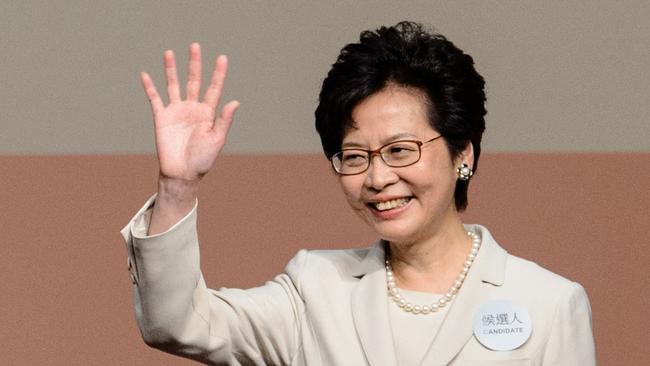Hong Kong chief executive Carrie Lam won’t seek a second term
Decision comes after five years of political and social turmoil that included mass protests and a national security crackdown.

Hong Kong Chief Executive Carrie Lam will not seek a second term in office, as she nears the end of a five-year stint marred by the biggest social turmoil in the territory for more than half a century and a Covid-19 wave that has killed thousands.
Ms Lam, whose term expires on June 30, said on Monday that her decision not to run was based on family considerations and she had informed China’s central government of her decision last year.
The 64-year-old said she had been put under great pressure by the interference of “foreign forces” in Hong Kong’s affairs as well as the onslaught of Covid-19, but praised Beijing for its “staunch support”.
Hong Kong was rocked by mass protests in 2019 that brought millions of people on to the streets, but the uprising turned more violent as authorities cracked down on public rallies. China imposed a national security law in June 2020, which has led to the crushing of dissent in the former British colony, with no more street protests, activists fleeing abroad and scores of opposition figures in detention.
In recent months, Ms Lam’s government has been struggling to contain its biggest outbreak of Covid-19 to date, a wave that has been one of the world’s deadliest and led to restrictive social distancing measures that have closed bars, pools and gyms. Tight border controls in place for much of the past two years, many of which have only recently partially relaxed, have hurt the city’s reputation as a global business and finance hub, sparking an exodus of expatriate workers.
Hong Kong’s top official is chosen every five years by a committee of less than 1500 mostly pro-Beijing loyalists in a race that is carefully managed by Beijing. No clear successor to Ms Lam has emerged. Her deputy, John Lee, a hardliner on issues of law and order who used to run the city’s security bureau, has been mentioned in the local press as a potential successor.
Ms Lam’s tenure was marked by her attempt to introduce an extradition Bill in early 2019 that critics feared would make it easier for the Hong Kong government to send suspects to mainland China, whose judicial system serves as an organ of state power. The Bill prompted a wave of anti-government protests that culminated with the imposition of the security law.
Hong Kong officials have defended the law by saying it restored order, but the resulting crackdown has been condemned by Western governments. In its wake, the US has imposed a series of sanctions on top officials, including Ms Lam. Last week, the State Department warned that political freedoms in the city were continuing to erode.
In February, she invoked emergency powers to postpone the election from March 27 to May 8. Nominations opened on Sunday for candidates.
The Wall Street Journal



To join the conversation, please log in. Don't have an account? Register
Join the conversation, you are commenting as Logout